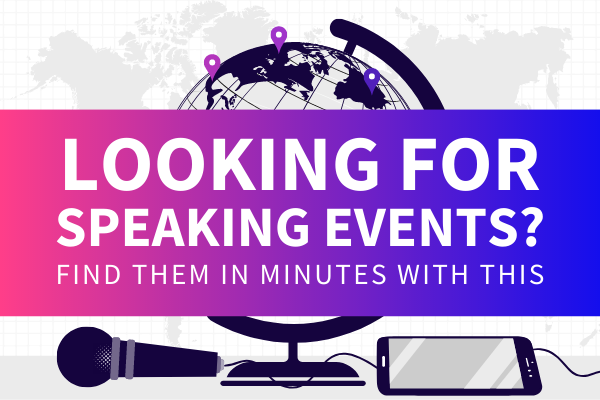If you’re getting started with speaking as a profession or side-gig, you might be wondering how to find events. You’ve worked on your speaker profile, online presence, your sales skills. Yet, your inbox still is coming up blank with opportunities. The cold, hard, truth is that speaking events aren’t likely to find you. If you’re looking for speaking events, you need to do the hard work of finding them.
The good news is you don’t have to lose hours and hours each week searching for events. It’s all about working smarter (not harder). With the right strategy, you can find the right speaking events in just a few minutes. Soon, you’ll have so many contacts filling your calendar you won’t know how to fit everything into your routine. A good problem to have, right?
The most important reality for new speakers is that it pays to be proactive. Unless you already have a lot of notoriety as a thought leader in your industry, you’re going to have to source events yourself. While a speaking agent might help fill in these gaps, that’s not the right fit for everyone. At SpeakerFlow, we’ve mastered the art of finding the right events without the traditional struggle.
Your time is valuable. You can’t afford to spend countless hours a week searching through event websites, LinkedIn, and social media. As soon as you know the type of events you’re ready to target as well as your niche, it’s time to skip the filler activities and jump to the chase. In this guide, we’ll highlight exactly what to do if you’re looking for speaking events. (Hint: it only takes minutes!)
Common Sources Of Speaking Events
First, what are the most common sources of speaking events? If you’re new to where you might find speaking engagements, you might completely be at a loss for where to begin. With 89% of event planners saying that securing the right speakers is one of the biggest challenges, you’re here at the right time.
The good news is that most speaking events come from the same sources. These are things you likely already have at your disposal. They might take a bit of upfront time investment, but this is how you build a long-term business designed to maximize current relationships. A bit of thinking outside the box goes a long way, but it mostly comes down to paying close attention to your existing network.
Referrals From Past Clients
First, the easiest way to land new speaking gigs is through referrals from past clients. If you’re looking for speaking events, consider who you’ve worked for in the past. They might know other events in your industry, and they might recommend you to other event planners.
Referral marketing is a powerful tool. It generates 3-5x higher conversions than any other marketing channel. People trust those they already know. If you come highly recommended from another professional who’s trusted in the industry, this speaks volumes. While you can always recommend yourself, there is much more weight when you’re recommended by others.
How can you land more referrals from past clients? The best way is by providing a top-level experience from the start. When you make yourself fantastic to work with, people want to rave about their experience. Conversely, a negative experience has the opposite effect. By making sure you truly deliver on value, you encourage your network to work in your favor. Along those lines, don’t be afraid to ask for feedback on what you can do better.
Repeat Business From Past Clients
Similarly, your past clients are more likely to hire you again in the future. Assuming you delivered an amazing experience, your past clients already know what value you offer. It’s easier to work with speakers you’re familiar with vs. new ones. This is why it’s important to make current clients happy. Think of it this way: who would you hire? Someone who did a great job in the past or someone completely new? The answer is obvious: we go with what we know.
Because you’ve already successfully sold to this client before, it’s much more likely you’ll sell yourself to them again. In fact, the probability of selling to an existing client is 60-70% whereas a new prospect is closer to 5%. When you deliver an amazing experience, this is something past clients will look forward to again in the future. You’ll be top-of-mind when it’s time to hire someone for an upcoming event.
Industries Experiencing Drastic Changes
Next, if you’re looking for speaking events, it might be worth expanding your horizons. When industries experience a drastic change, this is an opportunity for new thought leaders to come forward. Drastic changes might include the focus on customer experience (CX) or employee experience (EX), digital transformation, or the rise of new marketing techniques. Either way, if you can tie in your own experience, this is an opportunity to stand out.
While it’s important to niche down in your space, don’t be afraid to make moves when necessary. For example, if you usually speak to tech companies about the power of referral marketing, you might consider repackaging these topics for adjacent industries. The transition is usually easier than you think, and changing industries have less competition. Because companies in these changing industries are rapidly looking for ways to compete, they need professionals like you to guide the way.
Organizations That Recently Merged
Fourth, don’t be afraid to look at organizations that are shaking things up. When organizations merge together, this is a drastic change. There is usually an unsettled feeling amongst clients, employees, and the entire organization as a whole. Most leaders take action to dispel these feelings of unease, and this leads to the need for speakers. Getting two separate working cultures to “click” is no simple task, and it takes outside intervention.
As a professional, you might be just what this recently merged organization needs to get back on track. Through your inspirational and action-driven content, you make it clear what really matters. Better yet, these companies will look to you for guidance on how to bring employees together in a constructive way. This is a chance to show your true value.
Organizations Similar To Past Clients (Or Competitors’ Clients)
Finally, search for organizations similar to past clients. Yes, this might mean going to your competitor’s clients, and that’s okay. If you’ve seen others in your industry working with specific companies, odds are you might also be a good fit for their needs. If you notice other speakers on social media posting photos or videos of their past events, take note. You can use this to pitch the gig in the future.
While you should focus on yourself, you shouldn’t be afraid to look into what others are doing in your space. You can review other speakers’ public schedules, considering speaking gigs you’d like to work with in the future. If you’re a good fit for a specific organization, find similar options who compare. You don’t have to reinvent the wheel every time you want to land a new gig. Consider what worked in the past for you or your competitors and use this to your advantage.
How To Find Speaking Events With The Intel Engine
With that in mind, we’re now going to share how to find speaking events with the Intel Engine. The Speaker Intel Engine is a Google search overlay, and it pinpoints the best speaking gigs in seconds. Using skilled automation, you can find organizations, upcoming events, TED opportunities, and so much more that are the right fit for you.
The more you use the Intel Engine, the quicker it is to find qualified leads. The Engine reveals company details, contact information, and more in just a few clicks. While you should consider multiple methods for finding the right events, this is a tool all speakers can use to their advantage. Tech tools should make your life easier, not harder. The Speaker Intel Engine is here to help.
Identify An Upcoming Event Or Organization
First, your goal is to find an event in your wheelhouse or an organization in your target market (that’s experiencing some kind of change). Though you could find this information on Google, LinkedIn, or other prospecting tools, it would take so much longer. There are only so many hours in the day, and this is an option that takes only minutes.

To begin, open the Intel Engine and follow the steps below:
- Navigate to the “Speaker Opps” section to see what opportunities are currently available.
- In the “Topic or Industry or Type” field, enter a phrase or keyword that accurately describes the type of event or organization you’re trying to prospect. If you’re seeking opportunities from marketing companies, for example, you might search “marketing.”
- You can enter the year you’re searching for in the “Year’ field, but this is optional.
- If you’re targeting a specific location, type the city or state in the “Location” field. If you’re open to different locations or virtual events, leave this blank.
- Under “Recent Organizational Change,” choose an appropriate button to describe the change. If you’re seeking events (not organizations), skip this step.
- Click the “companies” button to produce a new tab with Google search results meeting your requirements.
Once you’ve identified some events or companies that look like a good fit, navigate back to the original page to find decision-makers. This is where you make the magic happen.
Identify The Decision Maker(s)
Next, you need to know who to reach out to when finding the right events. As the saying goes, it’s not what you know. It’s who you know. You can find the top events and companies in the world, but none of that matters if you don’t know how to identify the decision-maker(s).

Who typically is the decision-maker for these types of events? This is usually someone with titles related to events or marketing. Look for key phrases like “event coordinator” or “events manager.” The title varies a bit depending on the organization, but it’s worth seeking this person out. While it might seem best to contact the execs right off the bat, this isn’t likely going to get any responses. You want to find the right person on the organization’s ladder.
Here’s how to identify decision-maker(s) with the Intel Engine:
- Under the “Speaker Opps” section, look for the “Decisions Makers” header.
- Enter the name of the organization you already found in the “Word in the Company/Association Name” field.
- Click “Find a Planner,” “Find an Executive,” or “Association Contact Info” button depending on the type of event you’re searching for.
- In a new tab, you’ll have a list of people that are part of your selected organization. Not all of them are directly related to decision-making for events, so look for those key terms we talked about earlier.
Compile Their Contact Information

Finally, it’s time to compile this contact information into your organization tool or CRM of choice. When you’ve identified potential decision-makers, you need to verify that it’s correct. To do this, go back to the Intel Engine’s “Contact Information” section. Enter the email address you found and see if it’s verified. If so, you’re ready to begin the sales outreach process. That’s all there is to it!
What types of contact information do you want to look for? While this depends on your goals, you’ll want to have an accurate email address at the very least. This gives you a way to contact the decision-maker(s) directly. You might also want to find the following:
- Website URLs
- Phone numbers
- LinkedIn profiles
- Alternative emails
If one method fails, you have backup options. It can sometimes be tricky to make the right contacts, so this is likely where you’ll spend the most time. Think of how busy you are in your daily life. This is how decision-makers feel as well, so having multiple ways to contact them can make all the difference. If at first you don’t succeed, try, try, try again.
How To Pitch Speaking Event Planners
Now, since you know how to find speaking events, you’re ready to pitch speaking event planners. When you speak, you transform into an authority on your subject of choice. This not only attracts more business, but it positions you as a real-world thought leader. However, pitching can be intimidating no matter how experienced you are as a speaker. It’s scary to put yourself out there.
From preparing to do outreach to sending a fine-tuned proposal, there might be small details you don’t know about. These are learned through years in the speaking space, and they aren’t always obvious. Luckily, we’re here to share these lesser-known rules that level up your pitches (and close more sales). No matter where you’re at in your speaking journey, here’s how to pitch decision-makers.
Customize Your Sales Outreach
First, we’ve moved on from one-size-fits-all. It’s true that you might have gotten away with templated emails and generic sales messages in the past. Unfortunately, this is a thing of the past. People expect customization, and it will make or break your speaking sales pitch. If you’re looking for speaking events, you need to put in the extra time to show you’re willing to do the work.
Attention spans have never been in greater demand. We’re all busy, and we all have inboxes that are miles long. If you want to get someone’s attention when it matters, you need to make an impact. This means understanding the value you have to offer event planners and making it clear that you know what you’re doing. Not only will this land you more opportunities today, but it will make them want to work with you again in the future.
Use Your Tech To Keep You On Track
Similarly, you don’t have time to juggle everything on your own. If you’re looking for speaking events, you need to make the most of your time. That means it’s time to get a CRM if you don’t already have one. (Hint: SpeakerFlow’s CRM is built by speaking industry experts to make this process 100x easier for you.)
With your CRM, you can set reminders for following up, create actionable email templates, and track sales processes. Though it might sound simple, organization makes all the difference. When you know where you’re at with every stage, the easier it is to handle multiple outreach processes (and clients) at once. This translates to more revenue—score! While you might choose to outsource this in the future, make sure you nail down your tech strategy sooner rather than later.
Keep Their Needs Front & Center
Next, the needs of your speaking prospects come first. Though you might be the main event with your speaking skills, they don’t want to hear about how awesome you are. They don’t care about your years of know-how and other buzzwords you pull out of thin air. In reality, people are selfish creatures. They want to know how your experience and skills help them and their team.
When you structure your sales and outreach around them, they’re much more likely to respond to your efforts. There should be no confusion about why you’re the right choice. Instead of thinking how you’ll pitch potential clients, think how you can help them. When you engage from a helpful standpoint, people notice. Everyone appreciates when they find someone who makes their life easier.
Offer Pre-Packaged Speaking Packages
Another important thing to consider when looking for speaking events is the value of pre-packaged options. Speaker fees can be confusing, and you don’t want to lose prospects in the nitty-gritty details. One option is to build tiered or packaged offerings. This bundles several products or services into one, making it easier to upsell yourself without being overly promotional.
By keeping it simple with only a handful (3 tops) of options, you prevent decision fatigue and overwhelm. Better yet, you can be transparent about what’s included in each package, from additional consulting, pre-event promotion, and so much more. Not only will you save time negotiating, but you have an option to suit your clients’ needs to a greater degree.
Don’t Skimp On Your Proposal
Last but not least, don’t skimp on your proposal. This might be your only opportunity to get noticed, so you need to make the most of it. How can you stand out? There are a lot of great ways: include a custom video, reference problems you’ve talked to them about before, and design everything to look professional.
Every interaction with a potential client is a chance to show your value. When you put a lot of effort and care into even small communications, it shows integrity. They know you take your work seriously, and you aren’t all talk. While you shouldn’t judge a book by its cover, people certainly do just that. With only 13 milliseconds to make a good impression, don’t let your proposal fail because it’s not well designed.
Finally, don’t forget to customize your proposal. You’re expecting your clients to invest in you. The least you can do is invest in them first by adding customized elements to the proposal to show you mean business. Whether you add testimonials from mutual connections, specific event ideas, or company changes, you want to demonstrate that you’re a strong listener.
Discover and Land More Speaking Events
Ultimately, if you’re looking for speaking events, don’t expect them to appear out of thin air. These steps above are so simple anyone can do them, but they do take the right foundation. Once you have a surefire strategy for sourcing potential events, you’re ready to take your speaking gig to the next level.
Well selling yourself isn’t always easy, it’s non-negotiable in today’s world. The better equipped you are to handle the industry’s changes and find top-tier clients, the more competitive you’ll be. What are you waiting for? If you have minutes to spare, you can find new speaking events.






